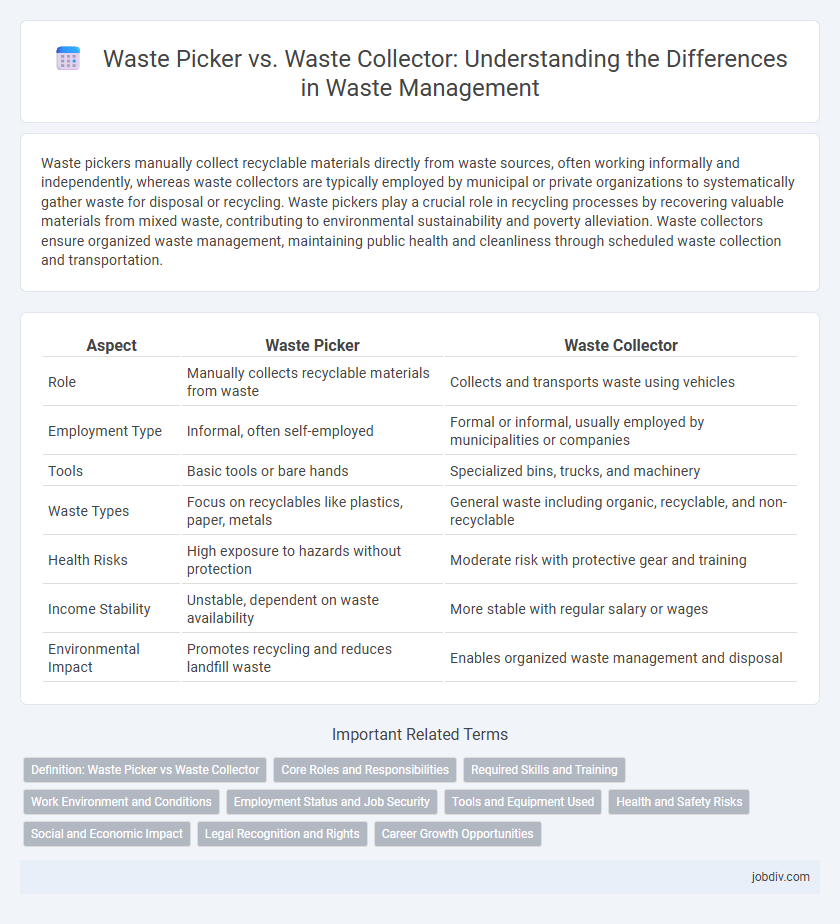Waste pickers manually collect recyclable materials directly from waste sources, often working informally and independently, whereas waste collectors are typically employed by municipal or private organizations to systematically gather waste for disposal or recycling. Waste pickers play a crucial role in recycling processes by recovering valuable materials from mixed waste, contributing to environmental sustainability and poverty alleviation. Waste collectors ensure organized waste management, maintaining public health and cleanliness through scheduled waste collection and transportation.
Table of Comparison
| Aspect | Waste Picker | Waste Collector |
|---|---|---|
| Role | Manually collects recyclable materials from waste | Collects and transports waste using vehicles |
| Employment Type | Informal, often self-employed | Formal or informal, usually employed by municipalities or companies |
| Tools | Basic tools or bare hands | Specialized bins, trucks, and machinery |
| Waste Types | Focus on recyclables like plastics, paper, metals | General waste including organic, recyclable, and non-recyclable |
| Health Risks | High exposure to hazards without protection | Moderate risk with protective gear and training |
| Income Stability | Unstable, dependent on waste availability | More stable with regular salary or wages |
| Environmental Impact | Promotes recycling and reduces landfill waste | Enables organized waste management and disposal |
Definition: Waste Picker vs Waste Collector
Waste pickers are individuals who collect recyclable materials directly from waste sources such as streets, bins, or landfills, often operating informally and independently. Waste collectors, in contrast, are typically employed by municipal or private waste management services to systematically gather and transport waste using designated vehicles and equipment. The primary distinction lies in waste pickers' focus on reclaiming reusable materials for resale versus waste collectors' role in formal waste removal and disposal.
Core Roles and Responsibilities
Waste pickers primarily collect recyclable materials from streets, dumpsites, and households, playing a crucial role in informal recycling systems. Waste collectors are responsible for systematic collection, transportation, and disposal of municipal solid waste, ensuring public sanitation and environmental health. Both contribute to waste management but differ in operational structure, scope, and formal recognition.
Required Skills and Training
Waste pickers require minimal formal training but develop extensive knowledge of recyclable materials and efficient sorting techniques through experience. Waste collectors need basic physical fitness and understanding of waste management protocols, often receiving training on safe handling and transportation of refuse. Both roles benefit from skills in environmental awareness and adherence to safety standards to ensure effective waste management.
Work Environment and Conditions
Waste pickers often operate in informal, unregulated environments with minimal safety measures, exposed to hazardous materials and extreme weather conditions. Waste collectors typically work within structured municipal or private systems, benefiting from protective gear, regular schedules, and defined routes. The disparity in work environment and conditions significantly affects health risks, income stability, and social recognition between the two groups.
Employment Status and Job Security
Waste pickers typically operate informally without official employment contracts, resulting in limited job security and no access to social benefits. In contrast, waste collectors are usually formally employed by municipalities or private companies, providing stable income and legal protections. The informal status of waste pickers often leads to vulnerability in income and lack of recognition in the waste management sector.
Tools and Equipment Used
Waste pickers primarily use basic handheld tools such as gloves, carts, and sacks to manually sort and collect recyclable materials from dumpsites or streets. Waste collectors rely on more specialized equipment, including waste bins, compactors, and collection trucks equipped with hydraulic lifts, enabling efficient transportation of large volumes of waste. The distinct tools highlight the informal, labor-intensive nature of waste picking compared to the mechanized, systematic approach of waste collection services.
Health and Safety Risks
Waste pickers face higher health and safety risks due to direct contact with hazardous materials, sharp objects, and exposure to toxic substances without proper protective gear. Waste collectors, often working within organized systems, benefit from equipment like gloves, masks, and mechanized tools that reduce physical strain and risk of injuries. Both groups require targeted health training and improved safety protocols to mitigate risks associated with waste handling and environmental contamination.
Social and Economic Impact
Waste pickers often work informally, collecting recyclable materials that significantly reduce landfill waste and greenhouse gas emissions, while creating livelihoods for marginalized communities. In contrast, waste collectors usually operate within formal systems, providing organized waste management services that improve urban sanitation and public health. Both roles contribute to the circular economy, but waste pickers face social stigmatization and economic insecurity despite their environmental contributions.
Legal Recognition and Rights
Waste pickers often operate informally without legal recognition, leading to limited access to social protections and labor rights compared to waste collectors who are typically employed by municipalities or private companies and granted formal employment status. Legal recognition of waste pickers varies globally but remains a critical factor in enabling their inclusion in waste management systems, securing fair wages, and ensuring occupational safety. Formalizing waste pickers' roles promotes their rights, facilitates access to health care and social security, and supports sustainable urban waste management practices.
Career Growth Opportunities
Waste pickers often face limited career growth opportunities due to informal working conditions and lack of access to training programs. In contrast, waste collectors employed by formal organizations benefit from structured career paths, skill development, and potential advancement to supervisory or managerial roles. Investment in vocational training and integration into formal waste management systems significantly enhances career prospects for those in the waste sector.
Waste Picker vs Waste Collector Infographic

 jobdiv.com
jobdiv.com